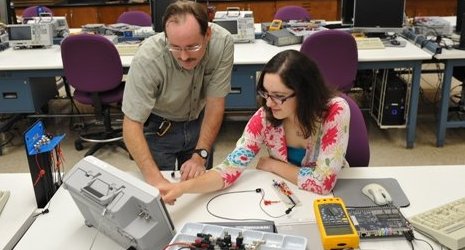Winter break is over and the spring semester is underway at Michigan Tech – “spring” being a euphemism in Houghton for snow up to our eyeballs. I thought it might be a good time to write a few words about our undergraduate educational programs.
In the ECE Department we are all about teamwork and team projects. Our Senior Design program is a well-oiled machine with about 10 projects going each year, real industrial projects with real industrial financial support. Our Enterprise program, an alternative path to completion of the capstone design requirement, is unique to Michigan Tech; it gives students the opportunity to form their own virtual companies and work on projects that have longevity across semesters and across multiple personnel. Of course, we are not alone in this approach. All ECE Departments across the country recognize the importance the team-based design projects, as do the employers that hire new graduates every year. It is also a critical piece of everyone’s ABET accreditation.
What distinguishes Michigan Tech from many other institutions is our philosophy in the early part of the curriculum. We believe very strongly that the best path to becoming a valuable team member is to develop individual skills. I don’t think this is particularly controversial, and is unquestioned in other fields of human endeavor. Think of an orchestra, for example – every player has to know the technical aspects of playing his or her instrument, and enough music theory to understand what is going on. Or, think of a baseball team, where everyone has honed their skills in throwing, catching, and batting, and they know all the rules of the game. In both analogies, people bring their individual and diverse skills to the table, which makes the whole greater than the sum of the parts.
So it is in electrical and computer engineering. This is a wonderful and exciting field, with teams of people in major corporations and in small start-up companies changing the world every day through their ingenuity and innovation. The engineers who are going to make the biggest contributions are the ones who put in the effort early on to get really good at what they are doing. This needs to happen when students are young enough, and their brains are malleable enough, to learn new material with some degree of permanence – like playing the violin or learning to water ski. Author and social observer Malcolm Gladwell has pointed out that it takes about 10,000 hours to become an expert at something, and the 10,000 hours is about what you get by working 40 hours a week, 50 weeks a year, for 5 years – in other words, a college education. In the ECE Department we emphasize individual skills in both the mathematical and scientific fundamentals of electricity and electronics, and in the laboratory.
Our required sophomore electronics laboratory is a prime example. Each lab bench has exactly one chair in front of it. When I was interviewing for this position and getting a tour of the facilities, it was one of the first things I noticed, without anyone telling me. I was blown away by the elegance and simplicity of this approach to laboratory education. Each student is required to learn how to use the equipment and how to carry out the experiments, on their own, human against the machine. Not everyone is happy with this approach at first – not everyone is happy with two-a-day football drills either – but in the end I would be very surprised if any of our graduating seniors ever told me it was a bad idea.
We take a similar approach on the mathematical side of things. I teach a one-credit course to freshman called Essential Mathematics for Electrical Engineering. The scope is quite limited but I cover a few things that I think are critical in electrical engineering that don’t show up as much in other engineering disciplines – sinusoids, exponentials, complex numbers, complex exponentials, phasors, that sort of thing. Basically I want them to know Euler’s formula and what it means. (In fact, every semester I tell students that if they see me around town and can produce Euler’s formula from memory I will buy them whatever beverage they are old enough to drink. This has actually happened.) The course is pass-fail, and to complete the course the students have to pass an old-fashioned paper-and-pencil exam with no books, no notes, no nothing. The pass threshold is 70%, which is pretty draconian, but I give them up to three chances to pass it, kind of like a driver’s test. Again, this is consistent with our philosophy that there are few things that all EEs simply need to know cold, and there’s no getting around it.
Our goal is to set every student on a path where they can realize their greatest potential, whatever that looks like to them. We think that by instilling individual skills in younger students, and then putting students together as they mature so they can learn how contribute those skills in a team environment, is the best way to do that. So far it seems to be working.
– Dan Fuhrmann, Chair, ECE
